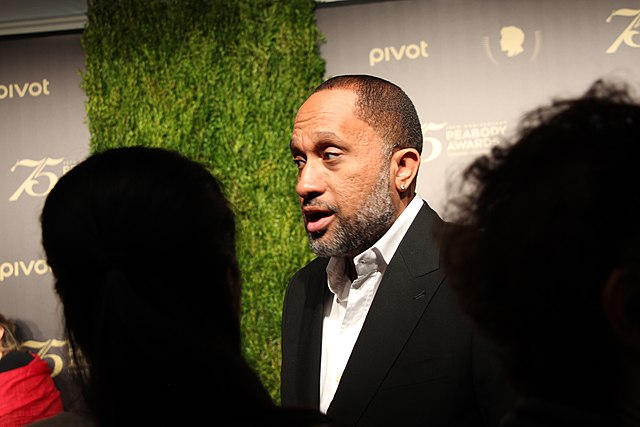‘You People’ misses its mark
Wikimedia Commons
“You People” director Kenya Barris at the 75th annual Peabody Awards for his show “Black-ish.”
February 14, 2023
Editor’s Note: This review will contain spoilers, so read with caution or watch the film and come back later.
Kenya Barris’ “You People,” which premiered on Netflix Jan. 27, provides laughs but contains very little depth, though not for lack of trying.
Up until its final 30 minutes, “You People” takes the form of a socially satirical comedy. The film follows Ezra (Jonah Hill) and Amira (Lauren London) as they navigate the highs and lows of their interracial, interfaith relationship. The real conflict becomes apparent when both characters’ families are introduced.
The first disaster strikes when Amira meets Ezra’s Jewish family. The main focus of this scene is Ezra’s mother, Shelley (Julia Louis-Dreyfus), while his aloof and apathetic father Arnold (David Duchovny) lingers in the periphery. Shelley, though well-intentioned, patronizes Amira and fetishizes the fact that she’s Black, making many assumptions about her cultural background.
The chaos only deepens when Ezra meets Amira’s Black, Muslim father, played by Eddie Murphy. The tension, both racial and religious, in these scenes is hilarious and astute, even if it is heavy-handed at times. Rather than attempting to depict these issues in a subtle and realistic manner, Barris and Hill write the jokes and gags in the film as an exaggeration of very real stereotypes and cultural tensions.
Though only one quarter Jewish in real life, Louis-Dreyfus does a fairly convincing job playing the archetypal doting Jewish mother. The coldness and one-dimensionality of Eddie Murphy’s character was disappointing, with the viewer never getting a real sense of who Murphy’s character is beyond his gruff, confrontational exterior.
One thing that occurred to me as I watched the film was the implication of having Hill, a Jewish person, and Barris, a black person, as co-writers. Given the current climate in Hollywood, it’s likely that Hill wrote the majority of the Jewish jokes and Barris wrote the majority of the black jokes. This division of work is logical, but it leaves the comedic style of the film feeling disjointed and inconsistent. Barris and Hill each have their own unique styles of humor and one can easily tell which jokes were written by who.
While “You People” begins as a funny, lighthearted take on modern race relations, as well as religion, the film falls apart the moment it tries to go deeper than that. In its final half-hour, the film forces a weak, half-hearted message of unity that seems to come out of absolutely nowhere. One moment, the characters are chaotically fighting and seemingly unable to set aside their differences and the next, everything is neatly wrapped up and they all suddenly love each other.
With a two-hour run-time, “You People” should have trimmed down the dragging, meandering second act and used that extra time to flesh out a more reasonable and satisfying conclusion. In spite of its glaring flaws, though, the film is too funny for me to not recommend watching it.
Anyone who goes into “You People” looking for a funny, occasionally topical comedy will be perfectly satisfied. But if you go into the film looking for anything more, you’ll likely be disappointed.







